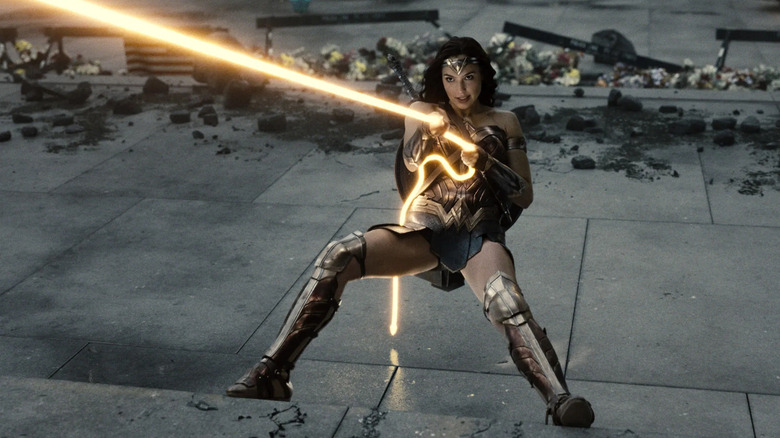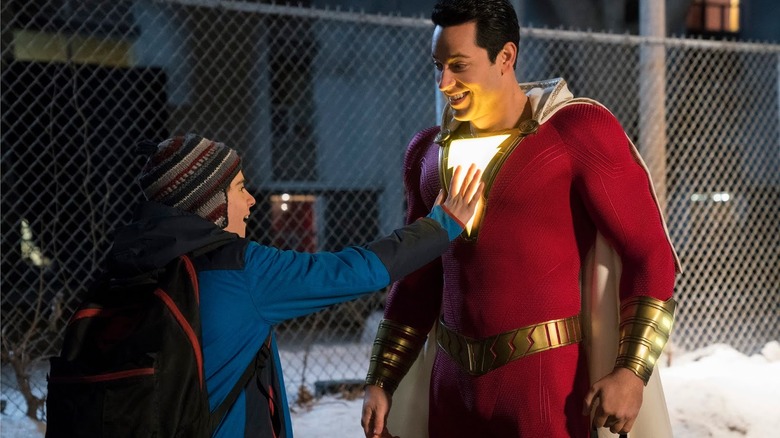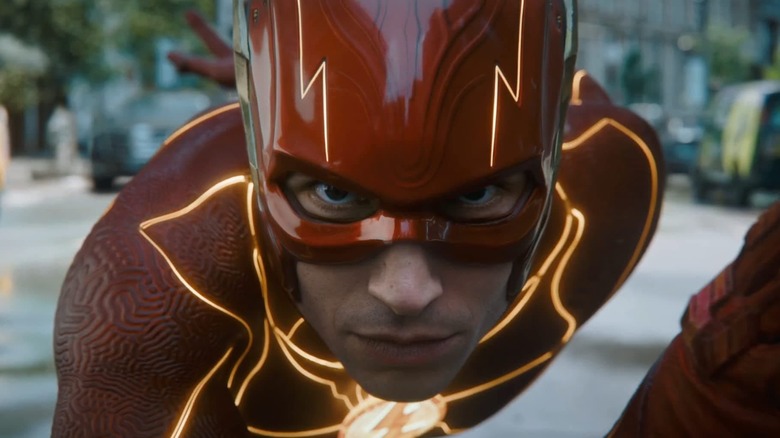The Correct Order To Watch DC Movies
The DC Extended Universe is dead.
Starting in 2008, several feature films based on Marvel Comics proved to be big hits, and Marvel Studios (in conjunction with Disney) would go on to rewrite the blockbuster landscape. For 15 straight years, Marvel dominated the box office by taking a serialized TV structure and applying it to movies, hence birthing the "Cinematic Universe." Each film in the Marvel Cinematic Universe was directly connected to all the others. In the "season finale episodes," characters would team up. The MCU never told very sophisticated stories — they all boiled down to "good guys" and "bad guys" engaging in pugilism — but they captured the public's attention like no film series had before.
Naturally, Warner Bros. tried to imitate the MCU's success by launching the DCEU in 2013. After all, Warner Bros. still owned the film rights to an enormous back catalogue of superhero characters, including Batman, Superman, Wonder Woman, The Flash, Green Lantern, and many others. Christopher Nolan's popular Batman series had come to an end, and it was time to start fresh. The first film in the new series was Zack Snyder's "Man of Steel" (2013), a somber, violent version of Superman that sharply divided audiences. A small, passionate contingent of fans loved Snyder's steely, bitter, adolescent angst, while others (like myself) found the film to be noisy and insufferably ponderous.
In the decade that followed, 14 additional DCEU films were released (15, if you count the two cuts of "Justice League" as two separate movies). Many of them bombed and more were critically lambasted. The final film in the series, "Aquaman and the Lost Kingdom" was released in December 2023. James Gunn will reboot the series entirely in a few years.
Here are all 16 films in the DCEU continuity.
The release order
Here is the release order of the DCEU film, presented for clarity:
- Man of Steel (2013)
- Batman v Superman: Dawn of Justice (2016)
- Suicide Squad (2016)
- Wonder Woman (2017)
- Justice League (2017)
- Aquaman (2018)
- Shazam! (2019)
- Birds of Prey (and the Fantabulous Emancipation of One Harley Quinn) (2020)
- Wonder Woman 1984 (2020)
- Zack Snyder's Justice League (2021)
- The Suicide Squad (2021)
- Black Adam (2022)
- Shazam! Fury of the Gods (2023)
- The Flash (2023)
- Blue Beetle (2023)
- Aquaman and the Lost Kingdom (2023)
These films, of course, wildly fluctuate in quality. "Man of Steel" and "Batman v Superman" are both directed by Snyder, and they bear the above-mentioned heady angst that feels deep when you're 13-years-old, but doesn't actually possess any substance. David Ayer's "Suicide Squad" is a chaotic mish-mash of edits and re-edits that feels like a TV commercial. Many liked Patty Jenkins' "Wonder Woman," a film set during World War I, but its ending undoes any intriguing ideas it carried.
"Justice League," like "Suicide Squad," was famously recut after Snyder had to leave the production due to a personal tragedy. Joss Whedon, uncredited, came in to rewrite and reshoot several scenes, leading to a sloppy but serviceable film. "Justice League" wasn't the "Avengers"-level hit that Warner Bros'. wanted, and an online campaign began to #ReleaseTheSnyderCut. Many fans thought that Snyder had completed a cut of "Justice League," and that WB just didn't have the temerity to release something so grand and epic.
It was eventually revealed that Snyder had a lot more he wanted to film, and he was given $70 million to complete a four-hour version of the movie, which was released on HBOmax. Weirdly enough, the long version, while richer and more complete, was just as entertaining as the short version. If we published gifs, this is where I'd include the gif of Hannibal Buress saying "Why are you booing me? I'm right."
The scandals
Unlike the MCU, the DC movies didn't possess artistic or tonal unity, allowing individual filmmakers to put more of a stamp on their films. Ironically, the sameness often attributed to the MCU proved to be a franchise strength, giving audiences something kind of tonally similar each time, be it a WWII epic or a space opera. The DCEU didn't possess the bland MCU sameness, but it also lacked cohesion. Sometimes the studio interfered, and sometimes not, leaving a weird mishmash of movies that don't feel connected and are often not good.
After the scandal of "Justice League," it was a free-for-all. James Wan's "Aquaman" was broadly stupid but immensely enjoyable, earning over a billion dollars at the worldwide box office. "Shazam!," about a boy who can transform into an adult superhero, might be one of the best the superhero genre has ever produced, easily on par with Sam Raimi's "Spider-Man 2." Cathy Yan's "Birds of Prey" infamously bombed, perhaps overestimating the public's interest in the character Harley Quinn; it was more a stoner movie than an action picture. "Wonder Woman 1984," was outwardly terrible, as was Dwayne Johnson's oddball vanity project "Black Adam." The less said about the expensive fiasco "The Flash," the better.
"Blue Beetle" was only guilty by association; it was generic and decent. The "Suicide Squad," "Shazam!," and "Aquaman" sequels all underwhelmed. The series is now officially over.
Tracing the DCEU might prove to supply a microcosm of the superhero trend. It was a decade of floundering, half-starts, and lucky hits; a depiction of what happens when a studio is chasing trends instead of starting them. It was a series that was always playing catch-up, and that never caught up.
R.I.P. DCEU. I'd say it was nice while it lasted, but ... I'm good.


